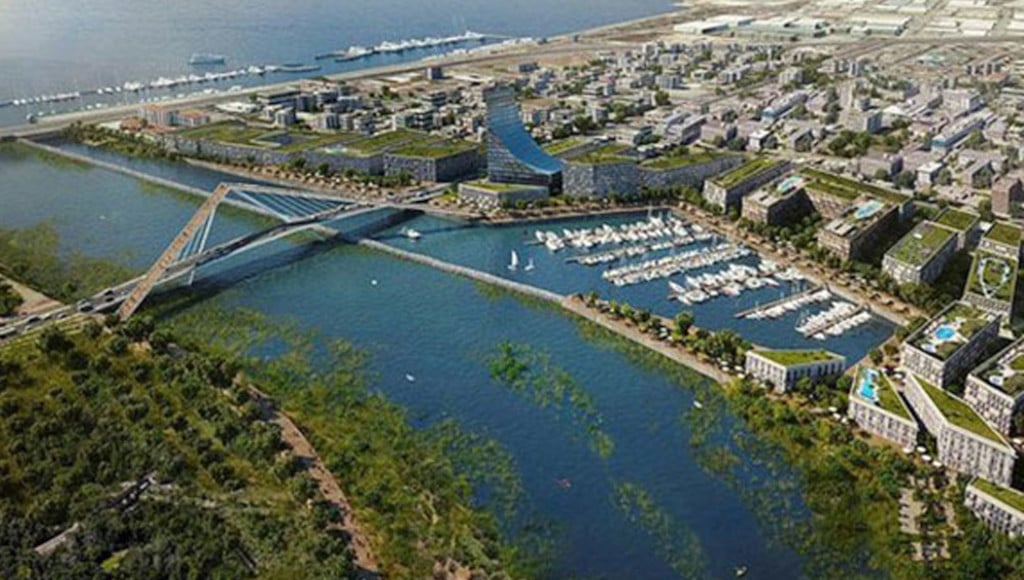Kanal İstanbul Controversy Resurfaces: Environment Minister Breaks Silence
Environment
2025-04-30 12:46:05Content

In a significant development, Turkey's environment minister has effectively distanced the government from the controversial Kanal İstanbul project, declaring that the massive waterway initiative is "not on our agenda" at present. The statement comes amid heightened tensions, following the recent detention of İstanbul city officials who had previously voiced opposition to the ambitious infrastructure plan.
The proposed sea-level waterway, which would create an artificial canal connecting the Black Sea to the Sea of Marmara, has long been a contentious project championed by President Recep Tayyip Erdogan. However, the latest arrests of municipal officials critical of the project have reignited public debate and drawn renewed scrutiny to the government's infrastructure ambitions.
Environmental experts and urban planners have consistently raised concerns about the potential ecological and geological impacts of the massive engineering project. The minister's recent comments suggest a possible recalibration of the government's stance, though the ultimate fate of the Kanal İstanbul remains uncertain.
As the controversy continues to unfold, the detentions have only served to intensify public interest and skepticism surrounding this high-profile infrastructure proposal.
Istanbul's Waterway Controversy: A Deep Dive into Turkey's Ambitious Maritime Project
In the heart of Turkey's geopolitical landscape, a contentious infrastructure project has emerged as a focal point of national debate, challenging environmental concerns and urban development strategies. The proposed Kanal Istanbul project has become a lightning rod for political tension, environmental activism, and strategic urban planning discussions that extend far beyond mere geographical engineering.Navigating Controversy: When Infrastructure Meets Political Complexity
The Genesis of Kanal Istanbul
The ambitious maritime project represents more than just a simple waterway. Conceived as a strategic alternative to the existing Bosphorus Strait, Kanal Istanbul promises to reshape Turkey's maritime infrastructure and potentially transform global shipping dynamics. Spanning approximately 45 kilometers, this artificial canal would create a new maritime route, potentially alleviating congestion and reducing maritime traffic risks in the historically challenging Bosphorus passage. Environmental experts have raised significant concerns about the project's potential ecological implications. The proposed canal would traverse sensitive geological regions, potentially disrupting delicate marine ecosystems and groundwater systems. Hydrological studies suggest the project could dramatically alter local water salinity, threatening biodiversity and potentially causing long-term environmental consequences that extend far beyond immediate construction zones.Political Dimensions and Institutional Resistance
The recent detention of Istanbul city officials who opposed the project highlights the intense political undercurrents surrounding Kanal Istanbul. This unprecedented move signals a complex power struggle between local administrative bodies and national government agencies. The environment minister's recent statement suggesting the project is "not on our agenda" adds another layer of intrigue to an already complicated narrative. Legal and administrative challenges have emerged as critical battlegrounds in the Kanal Istanbul debate. Municipal authorities have consistently questioned the project's environmental feasibility, economic sustainability, and potential long-term urban planning implications. These challenges represent more than bureaucratic resistance; they reflect deeper concerns about sustainable development and ecological preservation.Economic Implications and Strategic Considerations
Beyond environmental concerns, Kanal Istanbul carries profound economic and geopolitical significance. The proposed waterway could potentially generate substantial economic opportunities, including enhanced maritime trade routes, increased shipping efficiency, and significant infrastructure development. Preliminary economic projections suggest the project could generate billions in economic activity, transforming regional maritime logistics. However, economic potential must be carefully balanced against substantial implementation costs. Initial estimates suggest the project could require investments exceeding tens of billions of dollars, raising critical questions about fiscal responsibility and long-term economic sustainability. International maritime experts continue to debate the project's true economic viability and potential return on investment.Technological and Engineering Challenges
The engineering complexity of Kanal Istanbul cannot be understated. Creating an artificial waterway of this magnitude requires unprecedented technological sophistication and precise geological understanding. Advanced modeling techniques, comprehensive environmental impact assessments, and cutting-edge engineering methodologies will be crucial in determining the project's feasibility. Geological surveys indicate significant challenges in creating a stable, sustainable maritime corridor. The region's complex tectonic landscape, potential seismic activities, and intricate underground water systems demand extraordinary engineering precision. Each phase of construction will require meticulous planning and execution to mitigate potential environmental and structural risks.International Perspectives and Diplomatic Implications
The Kanal Istanbul project extends beyond domestic considerations, carrying significant international diplomatic implications. Neighboring countries and global maritime stakeholders are closely monitoring developments, recognizing the potential transformative impact on international shipping routes and regional geopolitical dynamics. International maritime law, environmental treaties, and bilateral agreements will play crucial roles in shaping the project's potential implementation. The complex interplay of national interests, environmental concerns, and strategic maritime considerations ensures that Kanal Istanbul remains a topic of intense global scrutiny and diplomatic negotiation.RELATED NEWS
Environment

Lightning Strikes Winter's Silence: The Rare Thundersnow Phenomenon Explained
2025-03-01 15:00:00
Environment

Behind the Laugh Track: Friends Star Exposes Dark Side of Sitcom's Backstage Culture
2025-03-05 09:18:39






